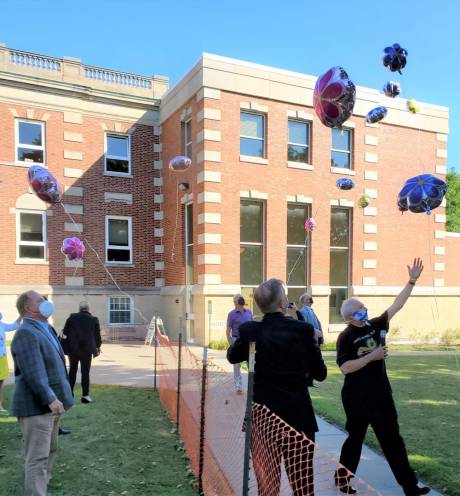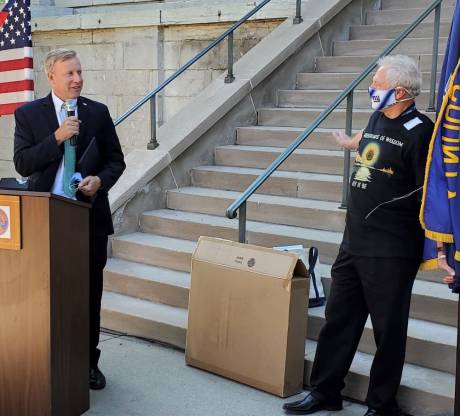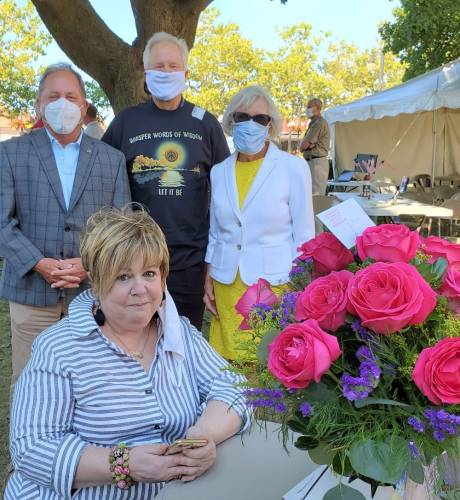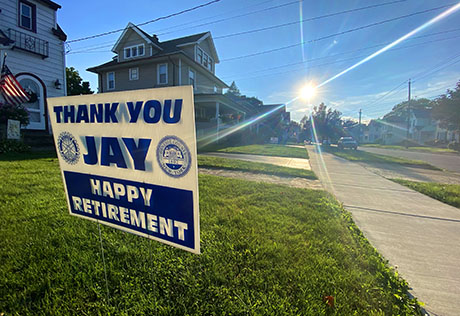For nearly eight weeks, the nation’s economy has been ravaged by the coronavirus, making the phrase “business as usual” a thing of the past, at least for the foreseeable future.
Governmental leaders are facing momentous decisions pertaining to expenditures -- weighing what is absolutely necessary against what can wait until the smoke clears.
And business sectors such as furniture, gasoline, clothing, sporting goods, department stores and food service are experiencing sales decreases of 25 percent and more.
As New York State inches closer to the first of four phases to reopen the economy, The Batavian reached out to Genesee County Manager Jay Gsell today with five important questions – a “Q&A with Jay,” if you will – to provide readers with the current state of affairs at the local level.
What is Genesee County doing to prepare for town and village reopening?
The towns and villages and city and county are under the same general 50/50 essential workforce everybody else is pretty much either working from home or at home and so we've been working on that basis. Certain parts of our workforce and some of the other communities like the City and the Village of Le Roy, we have law enforcement and those kind of things, our health department and our EMS department. None of them have been, quote, unquote, not working.
Overall, the goal was to have the 50/50 proposition almost right out of the gate as far as the state was concerned. We've all been following that. Now, as we're starting to prepare for May 15th, every Saturday morning we have a conference call with all of the local elected officials, the City, towns and villages, county legislators and (Assistant Manager) Matt (Landers) and myself, (Health Director) Paul Pettit and (Emergency Management Services Coordinator) Tim Yaeger to just get a status report on what's going on. That's starting to focus on what kind of return to work guidance is there. It really doesn't seem to differ except for those of us who have highway departments because we can bring them back now anyway because they're considered both essential and also construction activity kind of projects.
Our county highway department came back full force this week, our facilities management people also -- half of them were staying home, week on week off -- the towns and villages and City are starting to look at changing that also and again following all the protocol. So that's why all of our conference calls on Saturday start with the public health director and with the emergency management people -- Do they need resources? Do they need masks and face coverings? Do they need PPE (Personal Protective Equipment) and gloves and things like that? We try to do what we can to get that stuff in their hands -- distributing massive quantities of that kind of stuff to the extent that it's available.
And we also have to follow all the state guidelines with regard to social distancing, protective equipment, washing hands, not touching face. Even as we start to bring and plan for our office people and DSS (Department of Social Services) and Mental Health people, starting to bring them back in much greater numbers, we all have to have a plan to protect them and to deal with our clients and the customers.
At this point (furloughed employees) will not return for the first 30 days -- and that's presuming that May 15th is the date. Even the recovery restart, even in a region like Finger Lakes, could take upwards of a month just to get through the phases that they've outlined as to which businesses can or can't come back. We are putting together our internal plan ... for both our workforce and the public will deal with each other going forward.
How is Genesee County supporting the work of the City, neighboring counties?
I have daily conversations with (City Manager) Marty Moore and our department people communicate with each other – Human Resources, assistant county and assistant city manager, people like that -- and also with the counties and the whole statewide association, NYSAC (New York State Association of Counties), which has been very engaged. There's at least one or two or sometimes three phone calls a week with regard to what the rest of us are doing.
Sharing plans, sharing information -- we do that ad nauseum. It's not academia so plagiarism is not really a concern. If somebody's got a good plan, we just do it -- take from each other and those kind of things. So, we've been doing that consistently right from the get-go. Our friends from NYSAC from a statewide standpoint and us have interacted and interfaced with the governor's office and his executive staff that are out at this end of the state ... and in Albany, there's a daily COVID-19 conference call and it's been that way for the last five or six weeks.
That gives us information but also allows us to ask questions -- could you check this out and could you dispel this myth? -- things of that nature. When we get clarity, we pass that on to others of us who are of that (mindset) "inquiring minds want to know."
As specifically as possible, what is the fiscal impact of the pandemic upon Genesee County?
That's a really big unknown ... Right now, it has been suggested by our NYSAC colleagues that we can see anywhere from a 5 to a 25 percent reduction in sales tax, starting probably in the reporting period that covers the month of April going forward, but we don't know that yet. So, that could be anywhere from $3.6 million to $11 million in potential lost revenue just in 2020 in the county for sales tax.
Then we've lost DMV (Department of Motor Vehicle) revenue -- already probably about $80,000 of what we get to keep from the hundreds of thousands of dollars that we normally process on a monthly basis just in the first three months since this started. Mental Health has lost about $96,000 in billable hours of service. Now, they're still doing tele-health and in some emergency cases, they're still dealing directly with clients, but there has been a significant loss as far as contact, in terms of therapies and other things that, again, has been quantified to the tune of about $96,000 year to date from March 1st.
Same thing, I know the county treasurer in regard to what he has invested. There have obviously been lost earning opportunities with our investment portfolio through the three+one program that (County Treasurer) Scott (German) has been using for the past couple years. And there are other fees and charges such as health department fees for events like the Rotary pancake breakfast where charges for permits are incurred. Events that have been cancelled will mean a loss of revenue there; we haven't quantified that yet because really the start hasn't happened.
Even park reservations -- that's a really big thing. We'd like to think that after May 15th we'll see some pick up there, but again with all the conditions and the protocols, it will not likely be what it's been in years past as far as the number of reservations and the finances that go with that.
How is Genesee County bracing for cuts in revenue and state reimbursement?
We have put on hold or rolled over to another year probably about a million dollars’ worth in the county highway department, basically capital projects and activities that (County Highway Director) Tim (Hens) and company were going to be engaged in during this 2020 calendar year.
The uncertainty there -- in addition to that and including some airport construction -- is how much of the CHIPS (Consolidated Local Street and Highway Improvement Program) funding and the extreme weather funding that was in the New York State budget that was adopted on April 1st, how much if any of that gets reduced when the governor and the budget director come out -- probably this week -- with their first hit. Loss of state revenue means loss of state aid to everybody else. That's a really big unknown.
Plus, we’ve got 48 people approximately on furlough and we have another 44 positions on the strategic hiring freeze; together those things represent about $200,000 a month in expenses we're not incurring. And we're also looking at what else we can do to rein in other expenses.
It's on multiple fronts and this is just to get through the next 30, 60, 90 days. Then when we start putting together a 2021 budget, things may carry on from here right into that process and throughout that year.
How important is the need for federal funding for Genesee and other counties in New York State?
That's for all local governments because there is a palpable loss of revenue. The way that the (federal stimulus) 4.0 is apparently being structured, there will be the opportunity for New York State county governments, city governments, and town and village governments who are not part of the CDBG (Community Development Block Grant) entitlement program in this next round of stimulus funding to actually receive direct aid -- not going through the State of New York, but direct aid because of the fed stim 4.
So, what that could mean, obviously is, to a certain extent based on the figures we just talked about, some part of those would be potentially backdropped (to local governments) by virtue of this federal stimulus money. The problem is ... we have a range of options. You can go from just getting a crew cut in terms of revenue loss to a literal beheading -- and right now the beheading looks a lot more probable than the crew cut with regard to state aid, state reimbursement, loss of sales tax and what may or may not be coming out of the federal stimulus program. That's something that hopefully we will know by the end of the month of May.
But even today as you look at the back and forth between the federal government and the House versus the Senate, and in some cases, the governors, it's very partisan and quite ugly with regard as to where do we fit in to what is supposed to be a revenue replacement program coming out of fed stim 4.
To summarize, there are significant cautions and concerns out there, and there are a few opportunities and hopeful horizons. We are planning for the worst and hoping for the best.








